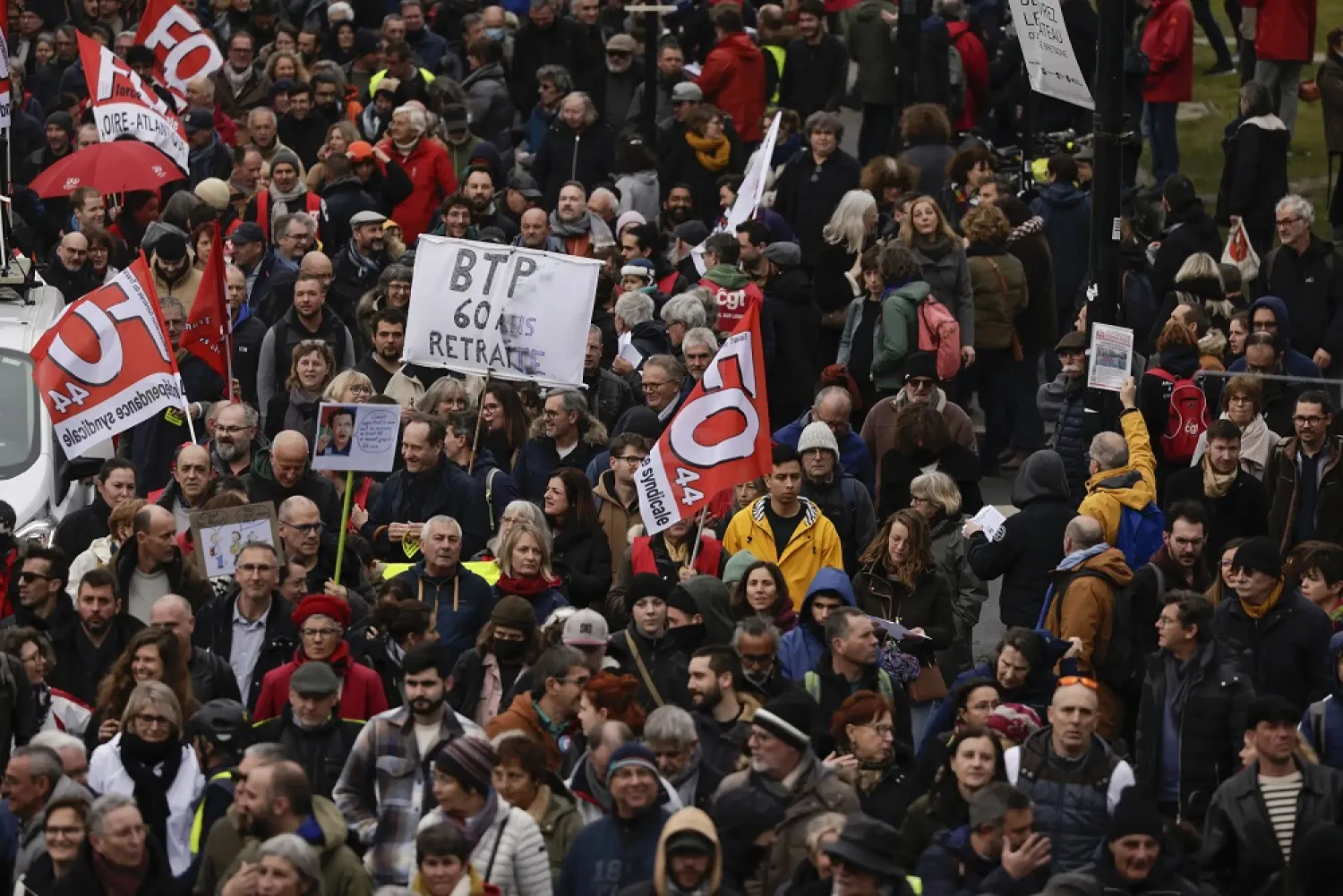Thousands of people angered over President Emmanuel Macron's plan to raise the retirement age joined a national strike on Wednesday as a committee of lawmakers advanced the proposal.
It remains to be seen whether Macron can command a parliamentary majority for his plan to raise the age from 62 to 64 so that workers can pay more money into the system. If not, he could risk imposing the unpopular changes unilaterally.
The plan also would deny a full pension to anyone who retires at 64 without having worked for 43 years — short of that, they'd have to wait until 67, The Associated Press said.
Macron has promoted the changes as central to his vision for making the French economy more competitive. Unions remained combative late Wednesday, calling on lawmakers to vote against the plan and denouncing the government’s legal shortcuts to move the bill forward as a dangerous “denial of democracy.”
Economic challenges have prompted widespread unrest across Western Europe. In Britain on Wednesday, teachers, junior doctors and public transport staff were striking for higher wages to match rising prices. And Spain's left-wing government joined with labor unions to announce a “historic” deal to save its pension system by raising social security costs for higher wage earners.
Spain's solution is exactly what French unions would like, but Macron has refused to raise taxes, saying it would make the country’s economy less competitive. Something must be done, the president has argued, to sustain France's current levels of pension payments with the retiree population expected to grow from 16 to 21 million by 2050.
In Paris, loud music and huge union balloons kicked off the 8th nationwide round of protests. An array of banners set the tone: “They say capitalism. We say fight,” read one. Others said “Paris enraged,” or “If rights aren’t defended, they’ll be trampled.”
“If we don’t speak up now then all our rights that the French have fought for will be lost.” said Nicolas Durand, a 33-year-old actor. “Macron is out of touch, and in bed with the rich. It’s easy for the people in government to say work harder, but their lives have been easy.”
Ten days into a sanitation workers' strike, Paris was awash in piles of rancid rubbish, which police ordered cleared out along the march route after troublemakers used garbage to start fires or throw trash at police in recent demonstrations.
A heavy security force accompanied the march through the Left Bank and disbursed a group of black-clad troublemakers that attacked two real estate offices, smashing their windows with fence panels. A total of 22 people were detained, Paris police said.
Security forces responded to violence with tear gas in other cities, including Nantes in western France and Lyon in the southeast.
The committee of seven senators and seven National Assembly lawmakers agreed on the final text Wednesday in a closed-door meeting, and a conservative Senate majority is expected to approve it as early as Thursday.
The situation at the National Assembly is much more complicated.
Macron’s centrist alliance lost its majority in legislative elections last year, forcing the government to count on conservatives’ votes to pass the bill. Leftists and far-right lawmakers are strongly opposed and conservatives are divided, making the outcome unpredictable.
Macron “wishes” to have a vote proceed at the National Assembly, his office said following an evening strategy session with Prime Minister Elisabeth Borne and ministers in charge of the bill at the Elysee presidential palace. Yet no firm decision was made and government talks were to continue Thursday morning.
Approval in the National Assembly Thursday would give the plan more legitimacy, but rather than face the risk of rejection, Macron could instead use his special constitutional power to force the bill through parliament without a vote.
French government spokesperson Olivier Véran said Wednesday that the bill will continue its way through the legislative process, respecting “all the rules that are provided by our Constitution.”
Republicans party lawmaker Aurelien Pradié — who opposes the reforms — said Wednesday that if this special power is used, he would lodge a challenge to the constitutional council, a higher French legal body.
Train drivers, school teachers, dock workers, oil refinery workers and others joined garbage collectors in walking off their jobs on Wednesday, maneuvering past thousands of tons of garbage piling up on the sidewalks of Paris and other French cities.
Interior Minister Gerald Darmanin asked Paris City Hall to force some of the garbage workers to return to work, calling it a public health issue.
The Paris mayor, Socialist Anne Hidalgo, said she supports the strike. Government spokesperson Véran warned that if she doesn't comply, the Interior Ministry is ready to act instead.
Public transport, meanwhile has been disrupted: About 40% of high-speed trains and half the regional trains have been canceled. The Paris Metro has slowed, and France's aviation authority warned of delays, saying 20% of the flights at Paris-Orly airport have been canceled.
Paris police said 37,000 participated in the French capital, 11,000 less than Saturday, even as polls show widespread opposition to the pension bill. The leading CGT union said 450,000 participated in Paris and 1.7 million across all of France.
“It will be those who work the hardest who will get a bad deal. It’s always like that," said Magali Brutel, a 41-year-old nurse. "Very rich people could pay more in taxes — that’s a good solution to pay for an aging population. Why are we effectively taxing the oldest and the poorest?”









